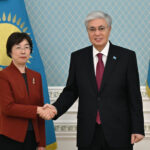A famous political observer and biographer, Mr. Daniyar Ashimbayev published the first in history of modern Kazakhstan encyclopaedical collection about Kazakhs, covering the period from the 18th to 20th Century. The collection is a good demonstration of how political trends influence the perception of the past.
This edition of 100 copies only depicts the evolution of ethnographic and historic views on the development of Kazakhstan and its population, starting from the nomadic society to the agrarian and industrial formation. The author investigated more than 20 encyclopedias published throughout various periods of history, as well as numerous sources of information to collect compatriots from the past and present in one place. Without myth-making about historic persons, so characteristic to many researchers, Mr. Ashimbayev showed how famous scientists of the past studied and characterized Kazakhs.
Civil War of Historians
18th-20th century encyclopedias show quite well the public development of the region and document key phases of the development of economy, as well as political and social institutions. They catch the peculiar features of the household customs and cover legal relations. Kazakhstan changed beyond recognition throughout those centuries, but some eternal values remained. For example, one of the authors wrote that “nomads are prone to discuss rumors and gossip, and like to spend time partying”
In the preface Mr. Ashimbayev expressed hope that the reading of the collection would not only be fascinating, but also encouraging readers to think and explore.
– Once upon a time, I did some excavations in archives of libraries looking for first written sources on the history of Kazakhstan. We all know about the researches performed by Mukhamedzhan Tynyshpayev and Sanzhar Asfendiyarov, which researchers are deemed to be the first explorers of the Kazakh history. The very first book, however, was written by Alexander Chuloshnikov, whom Mr. Tynyshpayev criticized. Afterwards, there was a publication made by Turar Ryskulov and then –Asfendiyarov. Ryskulov expressed severe criticism in regards to Asfendiyarov. Later, all of them fell victims to repressions. Then, there was a small book written by Mikhail Vyatkin.
In the years of the Second World War, the work regarding the publication of the History of the Kazakh Soviet Socialist Republic was commenced. That work triggered debates and a “civil war” among historians, ideologists and sociologists
A question emerged then — how did they accumulate and systematize data on history in the previous periods of time. Everybody knows about the researches made by Nikolay Aristov and Alexey Levshin, but those are purely personified opinions. There are monographs written by Vasily Bartold and Masanov Senior. As to the academic research, the situation was rather interesting. Old encyclopedias are inclusive of numerous articles written by reputable specialists, including local ones. One can clearly see the accumulation of data and interpretation of same, as well as the dynamic development of the ideological assessments of historic events. The latter is characteristic to the Soviet period of time. I thought that those interested in the history of Kazakhstan, could find Soviet-time works interesting. I collected them in one volume. Brilliant authors, interesting presentation of information, compared to pre-revolutionary researches, which were written in the populist manner.
Terms and Lexics
– Is there a big difference between ideological attitudes to the history of Kazakhs and the country, in general?
– Yes, especially Soviet academic publications show the clearly the emphasis, particularly in regards to most important events and how the data was accumulated. Soviet publications show well, how Kazakhstan developed in various spheres and retrospectively.
I wrote a preface, that explains some nuances. For example, today Central Asia stands for Kazakhstan, Kyrgyzstan, Uzbekistan, Tajikistan and Turkmenistan. But in some historic sources, Central Asia also includes Mongolia, Tibet and China with Xingjian. We must remember, that the scientific and the political definition of Central Asia varies.
There were changes in the definitions of such terms, as “Turkish”, Turkic” and “Tatar”. Interesting is the appearance of the term “Kazakh” or “Qazaq/Cossack” before 1936
All publications, I worked with are in open domains, anyone willing can look into them. But I paid attention that in our country, those sources are not in active use.
– You study history from archives, as well. How much time did it take you to write the “Most Cultured People” collection?
– Not much, to my great surprise – some three or four months. The most complicated thing was to compile the list of sources, study all articles and make something aggregate out of it. Very often, I saw duplications of information, because authors were based on sources in some cases, and on personal observations of situations happening where they lived and worked, in other cases. Those articles were written by Kazakh authors, and by prominent Orientalists of Russia and USSR.
Privatization of Historic Events
– In other words, they began to re-write the history long before our time?
– Of course. For example, some sources report that there were no Stone Age archaeological discoveries in Kazakhstan. Much later, there were publications about dozens of such discoveries. Soviet archaeologists identified numerous cultures, the studies of which could help form a more integral picture of historic processes in Kazakhstan and neighboring countries.
As for the ideology, be advise that in the first decade of the Soviet regime, the history was under command of the so-called Pokrovskiy’s School, by which the pre-Revolution Russia was nothing, but a “prison of peoples” and followers of that school practiced hypertrophic idealization of the national liberation movements
In late 30-s, the ideology governing history underwent changes. The concept of Russia, as “the prison of peoples” got substituted with the “least evil” theory, by which integration of various non-Russian/Slavic peoples with Russia was much better, than colonization of them by the English or Chinese. Later, historians switched over to the concept of the “voluntary joining”.
The interpretation of history was such, so not to trigger unwanted questions and to facilitate the friendship among ethnicities. The creation and the ranking of the socialist nations, territorial and language problem solution, as well as mainstream course of action aimed at proving the indigenous nature and the ancient history of each ethnic group resulted in some kind of privatization of historic events, statehoods and personalities. Arguable issues would get concealed, or become subjects of ideological campaigns.
After a series of conflicts around the essence of the national liberation movements in Imperial Russia, which conflicts took place in the 50-s, some experts re-visited the epic stories. In Kazakhstan, they formed a special commission, which commission categorized popular epic stores and legends, dividing them into the ones generated by common mass and by feudal leaders, as well as identifying those of them that were supposed to undergo changes making them closer to the common mass. In the 60-s, those processes were ceased and many popular epic stories, earlier criticized, became natural parts of scientific eco-system.
Ideological scientists in the USSR attempted to draft the history of the Soviet Union that would be deprived from inner contradictions. One templates would swap earlier circulating ones; some templates would simply disappear
In other words, for example in the historic encyclopedias, written before the Revolution, it was written, that Kazakhs did not take part in the Pugachev Anti-Tzarst Uprising. After the Revolution, scientists would proactively seek arguments proving the opposite.
There were different assessments of the ancient statehoods in Kazakhstan. Thus, for example, at a certain stage of history, they would actively criticize the Golden Horde. In the middle of the 40-s, the Golden Horde was something very negative, although before that time there were no absolute assessments of the Golden Horde. If we take a look into the Russian and Soviet sources about Alexander Nevskiy, we shall not see any discussions of his role in the establishment of the Mongol Yoke, except of very few documents. That particular role he played was not in compliance to the mainstream historical ideology, that is why they preferred to avoid writing about it. However, there was one Historian, Vadim Kargalov, who wrote that Nevskiy was the one who confronted and undermined the creation of the anti-Mongol coalition of Russians, the ruler, who would regularly invite Mongol armed forces to Russia and the one, who, in fact, brought Russia under control of the Horde.
In 1950, they began to criticize the Khazar Empire – after a period of positive assessment. In the same period of time, Imam Shamil, leader of Murids of Chechens, became a religious fanatic and an agent of global imperialism, although before his place in history was that of a leader of the national liberation.
From all sources, it becomes obvious that our, Kazakh, historians also preferred to avoid certain periods in history. Scythians and Sakas in the eyes of the global historical science are Irano-lingual Caucasians, while our historians insist that they were Turkified Mongols. Purely technically, the first ones were fully assimilated by the seconds
The reconstruction of the face of the Golden Man showed that the person European/Caucasian, but today all Kazakh books show the Golden Man as a person with Kazakh traits.
Denial of Facts
– In other words, your book is a documental answer to those denying obvious historic facts and trying to re-write history?
– The thing is, we do not have a full-fledged system historic approach – assessments would change, theories would swap theories. The new deceased Nurbolat Masanov and Irina Yerofeyeva produced some interesting pieces. Nurbolat Masanov’s father Yedige showed very deep knowledge of historic processes in Kazakhstan. His ethnographic insight into the Kazakh nationhood, published in the 60-s and re-issued recently, is one bright example. Bartold also has some deep accumulative data regarding the pre-Revolution history of Kazakhs.
To my purely subjective opinion, Soviet period did not produce any more or less significant pieces. Besides, in the last decade, a great number of non-professional historians surfaced, and they have bombarded our bookstores with their myths, sometimes associating ancient Kazakhs with Sumers, Romans and what not. Such tendencies are popular not only in the Kazakh nation, but others, as well
There are many interesting questions, particularly to political assessment of the past. Recently, we have seen the growing popularity of the Alasha-Khan, as the Founder Father of the Kazakh Khanate, acclaimed to exist back in the 12th century. The new deceased Irina Yerofeyeva confidently proved that the mythical Alasha-Khan was the historic figure from the 16th century, Khak Nazar. The Alasha-Khan myth emerged because of some discrepancies in the works of some archaeologists. Later, that discrepancy was replaced, by Alasha-Khan living in the 12th century forever got stuck in the public mind.
When you compare the emphases shown in various articles written in various years, you can find obvious answers to interesting questions. The trick is to know where to look for information. But the thing is, that our historiography of changes in political assessments is not a very popular thing
There are three particular research centers dedicated to the Kazakh history – Institute of History and Ethnology at the Academy of Science, Institute of History of Statehood in Astana and the Joshy Ulus Institute (not to count the Archaeology Institute). But Kazakh history authors produce not something fundamental and scientific, but something “paradoxical and curious”. Exceptions are Tursun Sultanov, Dina Amanzholova and Alexander Kyrdyrbayev, who work in Moscow and St.Petersburg and produce realistically scientific pieces.
“Righteous History”
– What is the reason behind the above tendency?
– It is that traditional political and public demand in myths, multiplied by nationalistic populism and liberalism, which ideologies are based on total negative assessment of the Imperial and Soviet past. Besides, we should remember that political elites, as a rule, are interested in criticism of predecessors and better publicity for themselves.
Day of Commemoration of Political Repression and Famine Victims once more showed the level of mythologization. In social networks, many users wrote than photos of “victims of repressions” that were exhibited, in reality were photos of prisoners of the Nazi concentration camps.
If we take a look at assessments of social, cultural and political and economic development for the last several centuries, the picture will be totally different to what they are trying to draw today.
Today, assessments of the Soviet period are universally negative. But there has not been a single complex research of the Soviet period, so far. All archives are open today – just go for it and avail yourself. But there is nobody there, all we see are people shouting about the “righteous” history. At some of the documents in archives, you can find marks that many people reviewed those documents, but for certain reasons those documents are not made publicly available. Nobody strives to draw an objective picture of the past. At present, they are associating the Old Kazakhstan with all that is bad, although the New Kazakhstan has many things that cause questions already. Unfortunately, the habit to give negative assessment to the past resulted in the fact that present generation of the youth have nothing left to be proud of.









